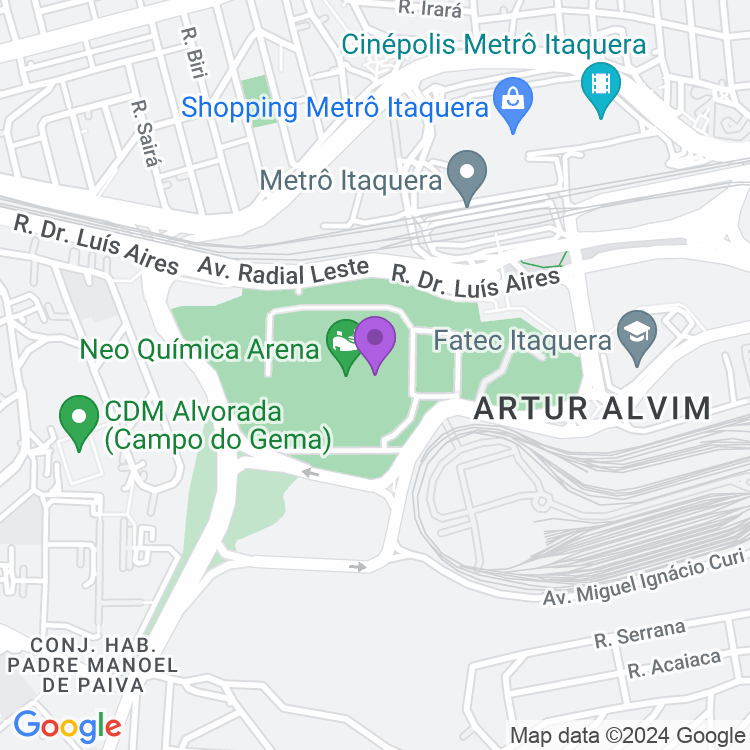Arena Corinthians
- Av. Miguel Inácio CuriItaqueraSão PauloSão PauloBrazil
- Stadium
- +55 11 2095-3000
- http://www.corinthians.com.br/arena/
The Arena Corinthians in São Paulo, Brazil, is the future home ground of Sport Club Corinthians Paulista, which when completed will be the fifth-largest stadium on the top tier of the Brazilian League and the eleventh-largest in Brazil, with a seating capacity of 48,234. The stadium will host six 2014 FIFA World Cup matches, including the opening match. Due to the request of at least 65,000 seats for the World Cup opening match temporary seats will be added to the stadium for the tournament.
Background
Corinthians planned to build a new 201,304-capacity stadium, as their own Alfredo Shürig Stadium held fewer than 14,000 people and city's Pacaembu Stadium had to be shared with other teams. Plans to build a new stadium required a large area, and then president Vicente Matheus asked for a concession to São Paulo's Mayor in the Itaquera region, east of the city centre. The request was accepted by mayor Olavo Setúbal on 10 November 1978 and a concession for 90 years was granted on 26 December 1978 for a 197,095.14 square metres (2,121,514.4 sq ft) property. The area was owned at the time by COHAB, an agency for popular housing controlled by the São Paulo City government. The original plan was to built the stadium in three to five years. The concession was renewed in 1988 for 90 years, with the condition that any construction made in the area would revert to the city at no cost. Funding was not obtained and other alternatives have been considered, like getting a concession for the Pacaembu Stadium and demolishing the Alfredo Schürig Stadium making room for another, among other proposals. Corinthians announced the construction of the 48,000-capacity stadium on 31 August 2010 with an estimated cost of R$335 million and an expected gross revenue of R$100 million per year. Corinthians expected to get financing from BNDES and sell the naming rights for the stadium to pay the construction costs. The main architect is Aníbal Coutinho, assisted by Antônio Paulo Cordeiro[1] from Coutinho, Diegues, Cordeiro (DDG), partnering with Werner Sobek who rendered structural engineering services. The stadium was planned to be concluded by March 2013.
Fifa World Cup 2014 Hosting
Geraldo Alckmin, Ronaldo and Gilberto Kassab on the day Arena Corinthians was chosen to host the opening match of FIFA World Cup 2014 Accenture estimated that the World Cup opening would bring R$30.75 Billion over 10 years to the city, estimulating the city to bring the opening match to São Paulo. A study from Fundação Getúlio Vargas estimated R$1 Billion in revenue just for the opening match, as 290 thousand tourists are expected for the event. Although Morumbi Stadium was originally selected to host the FIFA 2014 World Cup in São Paulo, they failed to provide proof of funding for a R$630 million renovations plan asked by FIFA in order to secure its spot; the stadium was then excluded from the tournament on 16 June 2010. The Local World Cup Committee looked for alternatives and set on offering Arena Corinthians to host the opening game; FIFA accepted the suggestion and confirmed the decision on 10 October 2011. Hosting the opening game required modifications on the original project that raised the cost from the original R$335 million to R$1.07 billion to accommodate FIFA's requirements. Cuts in equipment, furniture and construction costs brought the price down. On top of that, due to FIFA's agreements with Brazil, all construction related to the World Cup is not allowed to be taxed by the Federal Government; the final price agreed upon was R$820 million. A new contract was signed on 19 July 2011 with Odebrecht; R$400 million of the total were going to be financed by BNDES and the remaining R$420 million in tax credits granted by the City. A 2007 law stated that those tax credits could be used by any company who established itself on the Eastern region of the city, providing a credit of R$0.60 per R$1.00 invested. A new law was passed by the city legislature to deal specifically with this stadium and reduce the incentives, linking the concession of the credits to hosting the World Cup opening match and limiting the total amount of credits to R$420 million. The concession was justified by the fact that it is expected that the stadium will generate R$950 million in city taxes during the six years after its opening, R$530 million in excess of the tax credits given. The estimated construction cost did not include estimated R$35 million for adding temporary bleachers, planned to be removed after the World Cup is over. They will be set on one of the sides and on the north and south ends. The addition would raise the total capacity up to 72,000 seats, but the relocation of VIP areas and TV equipment will reduce the usable capacity. During the tournament, FIFA estimates that the gross capacity will be 67,349 and the seating capacity will be 59,955. After the World Cup, Corinthians will have to retrofit the stadium for regular use; they consider that the stadium will be 92% ready for their use after the tournament. The expectation is that it will be completely retrofitted by February 2015.
Construction Progress
As of 23 August 2013, the reported progress on the construction is 86%.
Opening Game
The first public football match at the stadium is planned to happen on February 2014


